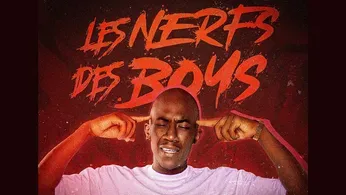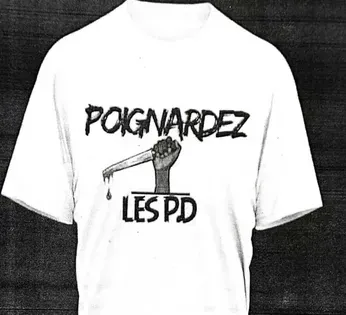
Source: Apple Music
Jan 26
Song that Calls for Stabbing Gay People Becomes a Big Hit in Cameroon
Robert Nesti READ TIME: 5 MIN.
A homophobic song that incites violence and openly calls for the murder of LGBTQ individuals has recently gone viral, topping the charts in Cameroon.
The Aussie website news.com.au writes of "a homophobic song that incites violence and openly calls for the murder of LGBTQ individuals has recently gone viral, topping the charts in Cameroon."
"The song 'Les Nerfs des Boys' ('Boys Nerves') by Snoopie le Mélodie, a Cameroonian artist, is classified as 'murder music.' This genre originated in Jamaica, was founded in 1988 by Jamaican dance hall star Buju Banton, and is known for promoting and glorifying violence against LGBTQ individuals," writes news.com.au.
Amongst its more toxic lyrics are:"poignardez les pédés" "(stab the f****ts") and "nous, on déteste les pédés" ("we hate f****ts"). The term "pédés" is short for pedophile and in Cameroon is homophobic slur for gay men, synonymous with "homosexuals" and "f****ts", since Cameroonias commingle homosexuality with pedophilia.
The song, which has been around since late last year, is available to heard on YouTube (and other music service sites). For the curious, Snoopie le Mélodie, can be seen performing it at this link with the warning that it may be hazardous to your well-being.
@je.te.lance2 Le retigno 🔥#partager #lesnerfsdesboys #viraltiktok #pourmoi #yaoundecameroun🇨🇲🇨🇲 #camerountiktok🇨🇲 #regarder #LIVE @Mr_wilson❤️🇨🇲 @PETIT VIRUS🎤🎼🇨🇲 @Dj_Peres237 🇨🇲 @BABACHIROU 🇨🇲 @snoopylamelo_officiel @Slim music 🇨🇲 ♬ son original - Je te lance
A TikTok video of Cameroon youths singing the song has gone viral.
According to the website Jeune Afrique,the video "shows a group of young people in full euphoria in a room, singing at the top of their lungs, in unison, a song with lyrics openly calling for violence against the country's LGBT minorities: Les nerfs des boys . "(...) We hate faggots, those who wear panties, those who wear diapers... sorry guys, stab, stab the faggots! (...) it's these faggots who give me the nerves." The song, which became a trend on Tiktok, was taken up by influencers and artists, despite warnings from some Internet users, worried about the violent and dangerous nature of these lyrics."
The website 76Crimes reports that the LGBTI advocacy group ADEFHO (the Association for the Defense of the Rights of Homosexuals) filed a complaint on Nov. 19 against the songwriter, which it identified as "X, known as Captain of the Ghetto". Elsewhere, he is identified as Snoopy la Mélodie.

The lawsuit states that the song has inspired homophobic gangs to attack allegedly gay men and that Snoopy la Mélodie and his team have distributed "Stab the Fxxxxts" T-shirts to promote the song and its message.
In December, 76 Crimes filed a second report that said "five French LGBT+ rights associations filed a complaint December 12 in a Paris court seeking to block distribution of a homophobic murder music song, 'Les nerfs des boys' ('Boys' Nerves') by Snoopy la Mélodie. . . The French advocacy groups – STOP Homophobie, Mousse, Adheos, Familles LGBT and Adefho – filed their complaint against Snoopy la Mélodie and his producer, Gouvernement Prod., for incitement to hatred and homophobic insults. This action comes against a worrying backdrop of increasing LGBTphobic violence, particularly in Cameroon."
Jeune Afrique acknowledged that many have been outraged, but also point out that Article 347 of Cameroon's Penal Code certainly criminalizes sexual relations between people of the same sex, a crime punishable by five years in prison, as well as a fine of up to 350 US dollars, or between 200,000 and 300,000 FCFA. But the outlet spoke to Cameroon political analyst Yvonne Chantal Bessecke who said,"at no time does the law stipulate that people convicted of these acts lose their fundamental rights, including the right to life."
She continued: "This right is guaranteed by the State, just like other human rights. When a Cameroonian incites violence using the ban on homosexuality as a pretext, he violates a fundamental rule: the right to life, an Internet user is offended, recalling that when a person breaks the law, there are legal remedies to act, such as filing a complaint.
"Under no circumstances should we encourage violence, such as inciting people to be stabbed – this is absolutely unacceptable," Yvanna Chantal Bessecke continues. "The legal framework in Cameroon is clear: although homosexuality is punishable by law, it provides for prison sentences, not death. "If the law had deemed that these acts deserved the death penalty, it would have provided for it. But that is not the case. However, some people believe themselves to be above the law, proclaiming themselves judges and executioners, as if they were demigods, dictating justice themselves."
And she called out Snoopy la Mélodie and others supporting the song. "As influencers or artists, you bear a heavy responsibility. Encouraging your subscribers to commit violent acts is unacceptable irresponsibility."
She concluded: "It's terrifying. If this song had been ignored, it might have sunk into oblivion. But it has been popularized, doubly endangering those it targets. And the artist is happy about it, even claiming responsibility for this violence."
According to the artist's manager, whom Jeune Afrique contacted, the term "PD" does not refer to homosexuality, but to "partisans of destruction (PD)". According to the manager, it would therefore not be a call for violence against homosexuals. But Jeune Afrique found contradictions in his statement in that he agreed that homosexuality is "contrary" to African morales, but does not see those who engage in homosexual acts as "partisans of destruction (PD)". When called on this, he told the publication to refer to the song's press release, which at the time did not exist.
Africa News says the song is representative of the Cameroon's Mbolé music genre, which developed 25 years ago in the nation's poorer neighborhoods as funeral chants to comfort mourners. Artists began to bring the music to the recording studio and "used this music to break taboos, address the reality of the neighborhoods or, for some, to ironize on society." Six years ago, the genre went mainstream. "Beneath the media success, mbole remains a versatile form of expression and is still very much rooted in poor neighbourhoods. Poverty, drugs and insecurity are recurrent themes among its young performers, some of whom have almost iconic status in their neighbourhoods.
Robert Nesti can be reached at rnesti@edgemedianetwork.com.







